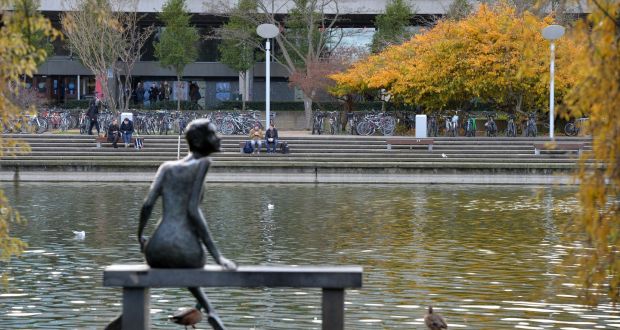
[dropcap]Election[/dropcap] season is upon us. Hustings, manifestos, posters, debates, campaign videos, free food, more posters, celebrity endorsements, cheesy slogans. Yes sir, it’s the annual Students’ Union elections.
I did not cast a vote in my first SU Elections back in 2015. To be quite frank I found the entire process quite polarizing. I didn’t know who the candidates were, what they were running for, why they were running or where to vote.
I doubt I am in the minority in this instance, as the election of student representatives falls quite short in the priorities of any nervous fresher staggering their way through their first year in university trying to navigate their way around campus, understand Harvard referencing, rent a book from the library and submit an assignment on Loop for the first time.
It all comes at you at once and unless you take an active and engaged participation in student politics the entire process can pass you by. But sadly this is not the case for just one fresher caught in a wave of new experiences. It is a wider issue of a lack of engagement across the board.
The turnout at the recent UCD Students’ Union elections, with just 3,237 votes cast for the role of President of the SU from a student body of over 30,000, showed a serious and worrying lack of engagement. The backlash to Katie Ascough’s victory would have you think otherwise.
Likewise the attendance at our own Students’ Union elections hustings was poor. Candidates had to stand in front of handfuls of students (there was an estimated 28 students in attendance at one hustings held on the St. Patrick’s campus) and explain why they were the best person for their position.
What must the candidates have been thinking selling their policies and manifestos to a crowd smaller than most everyday lectures? If they were not worried, they should have been, as it will be the job of those who are elected to eliminate this disengaged state of affairs between the student body and a participation in student politics.
The final hustings held on the Glasnevin campus did improve on numbers, as the Business Building lecture hall was packed to hear candidates speak. But the entire process was less than a serious occasion of fraught debate and clashing political ideologies.
The line which stuck with me upon departure was that of Returning Officer Cat O’Driscoll who had to calm proceedings at one point following a jovial exchange. “We want the SU to be taken more seriously, so can we start with the hustings?”, she said.
Student elections bring with it the annual debate of their relevance in our lives. You could, and many do pass through university without the need of their SU. But it is for their and all students benefits that the SU exists.
It is there to represent the students and make their lives easier. In our interviews with candidates over the last week we made it a case and point to ask them simply what they believed the role their were running for was, as it is a prevailing trend that most students simply do not know what their SU does for them.
As such, here are some helpful tips as we approach the end of election season and you cast your vote:
(i) do not be swayed by free food or merchandise. It is a ploy to obtain your vote in a simple and effective manner. Keep in mind that some candidates do not have the financial backing others do and always remember that more substance can be found in candidate’s words and in their manifestos than in a slice of pizza or free can of energy drink.
(ii) celebrity endorsements while funny and eye-catching are also fundamentally irrelevant. What does it mean if Craig Doyle backs your chosen candidate on their ability to represent students on significance issues like the strained mental health resources on campus, a sustainable solution to multi-campus lectures and the lack of an appeals process on campus accommodation?
(iii) make up your own mind. The nature of student politics means that you are going to vote for your friend who is running and they are going to get all of their friends to vote for them. Whether or not this is a fair way of electing representatives is redundant, because it happens. If you believe in the power of student politics to enact real and lasting change, then for your and everyone’s else’s sake vote for a candidate who you believe will be best not only for the job, but best for every one of DCU’s 16,000 students. Read the candidate’s manifestos, listen to them speak, ask them questions and make an informed decision on your own volition.
(iv) vote. Student politics means a great deal to a small group of people who actively engage in it, while for the majority it passes them by and makes others feel excluded to a union who is supposed to represent them. If you believe in a candidate’s abilities, then vote for them. If you believe the SU has not properly represented you and the issues you feel close at heart, vote for change. If you want the SU to become a legitimised entity which takes a stance on issues like the Eighth Amendment, the rights of LGBTQA students and Irish unification, then cast your vote. As witnessed in UCD recently, it is very easy to voice your concern afterwards. The most important thing first and foremost is to enact your right as a member of this union, give your voice a platform, enrich democracy and vote.
This week’s print edition of the paper does not focus on the candidates themselves due to the fact that the day after it has hit the stands the results will have already been decided in NuBar.
Inside tomorrow’s issue you will find an abundance of features and pieces explaining what the SU is, debating its relevance, arguing whether or not it is is popularity contest and explaining how being a part of it can affect a person’s career with interviews with both of DCU’s previous SU Presidents.
To read extended interviews and video features with all of the current candidates keep your eye on thecollegeview.com.
Election season is upon us.
Aaron Gallagher



